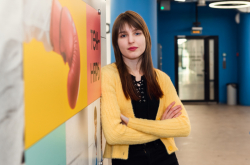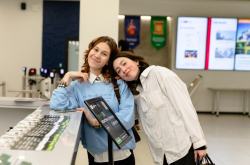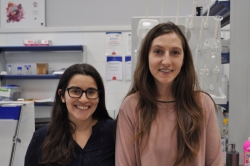Today, just like it always has, the science of weights and measures pervades all types of human activity; however, until very recently there were no educational programs in Russia to train top-tier experts in metrology. National Institutes dealing in metrology are key to developing such skills and knowledge in students.

Mendeleev National Research Institute of Metrology
VNIIM is one of the seven National Institutes of Metrology which are part of the system of the Federal Agency on Technical Regulation and Metrology (Rosstandart) – a body of government that enforces national policy on this matter. VNIIM is a pioneer in Russian metrology. Founded 175 years ago, it was headed for 15 years by Dmitry Mendeleev – author of the Periodic Law and the modern periodic table of elements. The institution stores nearly a third of Russia’s pool of primary standards (55 out of 165). The Institute also provides more than 70% of all the globally recognized measurement services. VNIIM is home to 4 of the 7 standard base units of measure: meter, kilogram, ampere and kelvin.
According to the staff, there are no other programs like this one in the country. A number of universities offer programs in metrology and standardization in specific applications. VNIIM and ITMO’s program sets a precedent for an education program that focuses on the entire system of management in metrology and standardization in the high-tech sector of economy.
ITMO.NEWS spoke to VNIIM’s Director Kirill Gogolinskiy, its Deputy Director for International Work Yuri Kustikov, as well as the deputy head of ITMO University’s Department of Ecology and Technical Sphere Marina Kustikova and the head of the new program Irina Timofeeva, about the program’s features and the reasons for the global metrological boom.

Irina Timofeeva, Marina Kustikova, Kirill Gogolinksiy and Yuri Kustikov
The new master’s program is implemented at VNIIM’s specialized Department of Ecology and Technological Sphere Safety that has existed for almost twenty years. What is the program’s purpose.
Kirill Gogolinskiy: Our aim is to train highly-qualified specialists in metrology in high-tech industry; that includes scientific metrology, too. We will train top-tier metrologists who will go on to work at organizations, research centers and plants all over Russia. I must admit, as the director of VNIIM I am interested in training new staff for our institution, as well. But the students who will study here will always be free to choose what they want to do and where.
Yuri Kustikov: Almost every industry and almost every enterprise has a chief metrologist and metrological staff. We often witness a lack of knowledge and awareness about metrology, which is why there can be miscommunication between our Institute’s metrologists and the specialists who deal with metrology issues in various industries. Our program, among other things, aims to solve this problem. We are witnessing a global metrology boom right now. This is caused by the need for metrologists who can work internationally to help overcome trade barriers; the amount of exchange of goods and services between various countries is increasing, which has helped form an international system for measurement dissemination. This system needs world-class experts to work. So this is, in fact, a global problem. There are international roadmaps which outline the development of metrology – our national metrological support system follows these plans, too.

Laboratories at VNIIM
There are already several Master’s programs in your department, namely the “Information Systems for Technological Sphere and Ecological Security” and “Information Systems and Measurement Technologies for Environmental Protection, Technological Sphere and Ecological Security”. What makes this new program unique?
Y.K.: The educational process will involve not only theoretical material in the form of lectures, but also a wide range of laboratory practice, supervised by great specialists and with use of unique equipment which is not available anywhere else in Russia, namely the primary standards held at VNIIM.
Another unique feature of our program is that the problems that our Master’s students will attempt to solve in their educational process are actual projects helmed by their scientific advisors. All the studies that the students will be able to present by the time they graduate are scientifically relevant and meet all the modern requirements.
Another advantage is that the subjects are taught in English, which is an important quality for a program that will prepare specialists for collaboration with metrology centers all over the world. We need to train specialists who will be in demand exactly due to their knowledge of international metrological terminology.
How did this partnership between VNIIM and ITMO University begin?
Marina Kustikova: ITMO and VNIIMO have been partners for 20 years now. Our university’s students have attended practical lessons, workshops and lectures from VNIIM’s top experts on many occasions. We realized that we are ready to create an educational program to properly train future specialists; after all, both the scientific community and the industry are in need of certified metrologists who understand the technological cycle and are familiar with the high-tech specifics of each and any enterprise.
Who is among the new program’s teaching staff?
K.G.: The subjects will be taught by heads of departments and leading researchers at VNIIM – these are world-renowned scientists who study these very same subjects at the Institute. A large number of VNIIM’s scientific staff are also lecturers at ITMO University. For instance, a key figure in the new program’s creation and its head is Prof. Leonid Konopelko, who is head of ITMO University’s Department of Ecology and Technical Sphere Protection and the head of VNIIM’s Research Center for State Standards in Physical and Chemical Measurements.

Laboratories at VNIIM
The staff also boasts a large percentage of young specialists. One example of the positive results from collaboration between young scientists and VNIIM’s scientists is their development of English-language courses for the program’s subjects (Yuri Kustikov, Deputy Director for International Work at VNIIM and Alexandra Mayurova, a graduate from our department who has also received a diploma of a translator in business communications while she studied). We ended up with an interesting balance in that our specialists take part in high-profile international research and, at the same time, share their knowledge with students.
Who do you expect to see among your students? What sort of entrance exams should the applicants expect?
Irina Timofeeva: This is the program’s first year and our target figure is 15 students. We have applicants from different universities: the St. Petersburg Polytechnic University, the St. Petersburg State University of Technology, the Mining University, the St. Petersburg State Forest Technical University, as well as students from Tomsk Polytechnic University, the Novgorod University, Yaroslavl State University and other places. We already have a 15-persons list of applicants recommended for enrolment; they are partially accepted based on their portfolio and their participation in the Young Scientists Conference, but on July 24-25 and August 7-8 they will need to pass their entrance exams on the subject of “Metrology and standardization”.
VNIIM’s specialized department only trains Master’s students. What made you decide to create another Master’s program and not a Bachelor’s one?
Y.K.: A metrology program of this kind has to be a Master’s program. To train top-tier experts, we need to pick students who already have a wide range of experience, since when they will start learning metrology, they will mostly be taught specific knowledge of certain measurement problems. The program mixes math, physics, computer science and other sciences. The students need to already have a scientific basis to easily begin designing and building their own instruments, to maintain them and to handle other tasks.

Laboratories at VNIIM
Which types of graduates are you most interested in seeing at your program?
K.G.: Keeping in mind the kinds of problems these future specialists will have to solve, they need to know the fundamentals of physics, chemistry, and electrical engineering – all the natural sciences (including biology); after all, the science of metrology concerns all areas of human life. When we talk about metrologists of highest qualification, especially scientists, we talk about people with fundamental knowledge of all basic sciences who are also knowledgeable in metrology.
I.T.: Some Russian universities have “Metrology and standardization” programs; it would be sensible for graduates of these programs to apply to our program. We also accept graduates of chemistry programs, engineers, physicists, etc.
What subjects and research areas should your future students expect?
K.G.: These will be both basic subjects and those that are explicitly related to the topic of instrumentation and measurement technologies; our specialists need to be apt in electrical engineering and the physical basics in data acquisition (sensors, primary transducers, secondary analog transducers, etc.). And, surely, in our age of digitization, they also need to be familiar with digital instrumentation, microprocessor engineering, programming, various forms of engineering. The core of the program is metrological subjects – legal metrology, methods of processing and other areas. During their training and practice at VNIIM, the students will be able to with the state standards – unique and complex measuring systems that ensure the utmost precision in various fields of measurement.
M.K.: If the graduates decide to build their careers in the industry, they could find employment as precision engineers, quality assurance specialists, etc. The giants of industry, such as “Emerson” or “Gazprom” are always looking for qualified metrologists for their project work. Since measuring systems are now present at every point of production, the graduates can work in many fields – from medicine, pharmacology and ecology to fossil fuel industry. Nowadays all the smart sensors need to be kept under metrological surveillance. Metrologists also ensure the creation and maintenance of high-precision measuring systems and devices.
What will the practical training look like?
K.G.: As I see it, one of the key stages of training is not just lectures and lab work, but participation in real projects at our Institute’s laboratories and departments. Our researchers are always hard at work on projects related to the science and the application of metrology. I am sure that we can provide a space for actual lab work to all of our students.

Laboratories at VNIIM
VNIIM and ITMO have launched this program as a response to the demand for young specialists. How many graduates is the Institute prepared to accept as employees after they have finished their education?
K.G.: The objective reality – not just in our Institute, but in the entire field of high-tech industry – is that there is a dire need for mid- and top-tier specialists and for young, qualified metrologists, too. We have great knowledge and experience, but the systems calls for participation of young talents. As VNIIM’s Director, I consider the issue of personnel a top priority. Of course, the final results depend on the students’ intentions and their level of training, but I believe that we would accept a half of our graduates.
Aside from need for staff in the scientific community; is there a real demand from the industry?
K.G.: There is a definite staff shortage in both areas. Young people, once they come to VNIIM and work with us for a while, soon become very welcome on the job market. High-tech fields (fossil fuels, public utilities, electrical engineering) tend to have sizeable budgets, so VNIIM’s experts are provided with great working conditions.

Is there a separation into tracks in the program or is this a unified program that doesn’t need specific branching?
K.G.: There is an idea in the works, actually, to separate lab work by fields of study – at some point. We have a polytechnical university and we cover a lot of areas – from medicine to materials science. For instance, some of the Institute’s strongest fields are physical chemistry, medicine and pharmacology, and oil-and-gas measurements. Naturally, when one is getting basic training, they need to specialize in something, which is why, at a certain stage, we can put our students on subject-specific tracks.
At which stage do you intend to begin that process?
M.K.: For the first semester, we will “study” our students, interact with them closely, and, by the time their first lab work starts, we will consider their wishes and interests to develop a personalized development track. The first half a year is the most important period for communication between the department and the student. In that time, we need to figure out the students’ preferences and abilities and work on developing these aspects. The defining feature of our department and this program is individual approach. After their graduation, the students can apply for postgraduate education at VNIIM or ITMO University.
Can the students take part in foreign exchange programs?
K.G.: Yes, they can. We’re currently working on a system of international internships and exchange trips. We have a constant program with the German national metrological institute PTB and other metrological institutions in Europe; we also work closely with our colleagues in China. Our graduates work all over the world. Russian metrology is, based on various aspects, placed in the upper half of the TOP-10; VNIIM, meanwhile, is one of Russia’s strongest metrological institutions.





